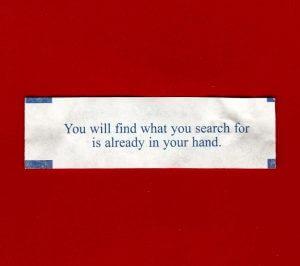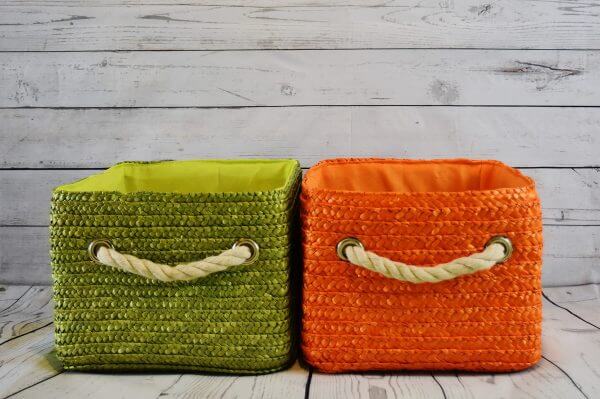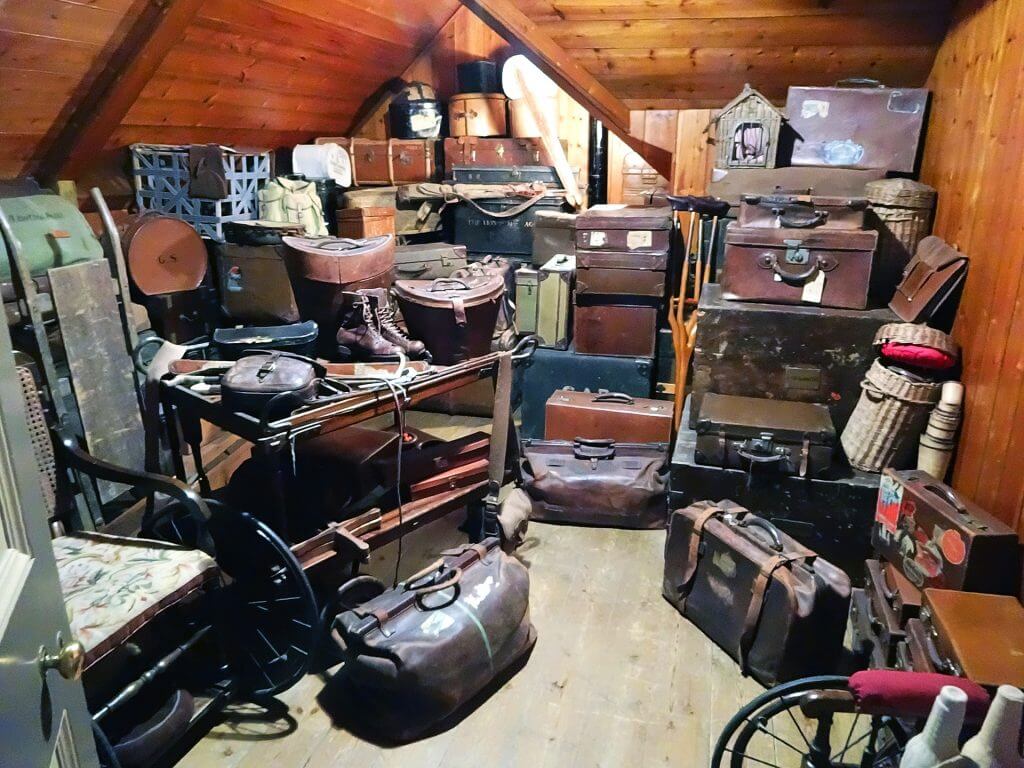Fortune Cookie Friday: Rummaging Through Life
 Have you ever misplaced your keys and realized that they were in your pocket all along? Do you have difficulty making heads or tails of boxes in the basement or the files on your computer? Do you sometimes feel overwhelmed in life? If you do, you’re not alone.
Have you ever misplaced your keys and realized that they were in your pocket all along? Do you have difficulty making heads or tails of boxes in the basement or the files on your computer? Do you sometimes feel overwhelmed in life? If you do, you’re not alone.
I was making dinner recently when I found that I was out of a crucial seasoning. I stopped what I was doing, turned off the stove—safety first—and ran to the store to get more oregano. I quickly returned home and added the seasoning. Phew! Crisis averted. When dinner was finished, I put the jar away only to find two identical jars of the same herb in the cupboard. In my defense, all those dry green herbs look the same.
This isn’t the first time I’ve done something like this, and it won’t be the last. I’ll admit that I can be scatterbrained from time to time. Unfortunately, the problem is not just a result of absent-mindedness. There is an underlying cause to all of this—lack of organization.
People collect a lot of stuff in life. Knick-knacks and tchotchkes cover our shelves. Clothing from various eras fills our closets. Even our calendars can collect an abundance of appointments that are hard to manage. A little organization in our lives can reduce the amount of chaos we endure, and save us time and money.
If you are one of those super orderly people, who have their stuff together, great. You probably don’t need any advice on organization, but feel free to read on. If you are not one of those super orderly people, well, you need to get your stuff in order. Don’t feel bad. I fall right into this category.

When it comes to seasonings, I try to keep them alphabetically ordered for emergencies (this is a handy tip I stole from Foghorn Leghorn). But what about the rest of our stuff? Life is more than a simple spice rack. Getting our possessions and lives organized can seem like a monumental task. Michele Panzer, Professional Organizer of Let’s Get Organized, shared some great tips for bringing order to our messy lives.
Purge
Get rid of the things that you don’t need or use. This seems like a no-brainer, but many of us have a hard time letting go. We spend a lot of time and money collecting our cherished items, but let’s face it, some have out-stayed their welcome.
Are we ever going to wear that button down shirt from the ‘80s again? Shoulder pads are out of style for a reason. Do we still have that cap and gown from graduation? Save the tassel, ditch the apparel. Discarding old clothes or ones that will never fit us again, will free up our closet space.
We can get rid our favorite VHS tapes too, especially if we don’t own a VHS player anymore. Many companies can transfer our videos and pictures to digital format. This way we can keep our memories of birthday parties and baseball games, but reduce clutter at the same time.
Placement
We should look at how we use items and where we store them. That fancy fondue pot we use once a year doesn’t need to take up space on our kitchen counter. That’s precious real estate—better utilized for freshly baked brownies.
Store things used most often in easily accessible places and tuck other things away. We can use this method with our dishes, coats, and files for example. Paperwork can pile up fast. If you can’t purge those files because of tax purposes, store them out of sight.
Schedule
Make some time, even a half an hour, to organize stuff. If we have some clutter, we shouldn’t put it off. It will only get worse. This is like spring cleaning but in manageable chunks. If we write it on our calendar, we can be sure it won’t conflict with other events.
Blocking off chunks of time can also help us stay productive. If we set a time limit, it makes the task feel less intimidating. We might think, “It’s going to take me all day to clean out the shed.” If we set a timer for 30 minutes, we will find that we will get further than we imagined—unless a big hairy spider halts our progress. Seeing how much we accomplished in that time span will also give us the incentive to keep going and finish the job.
Buddy System
The buddy system is common in scouting, athletic training, and even in the office environment. It keeps us productive, gives us someone to talk with, and expands our pool of knowledge for tasks.
Having a buddy for organizing can help as well. This could be a friend, a family member, or an organizer, like Michele. The buddy’s job is not to organize for us—unless they want to help. The buddy is there to encourage and support us. A buddy is great when we need to clean up the garage or clean up our lives.
Don’t Buy Stuff to Organize
Many of us run out and buy bins or baskets to curb the chaos of our stuff. Michele recommends that we wait. We should purge and review placement before we add any additional items for organization. Once we have our things scaled down to a manageable amount, then we can put them in matching totes.

When managing time, utilize what you have first. There is no need to buy fancy scheduling calendars that take up half a wall when a simple one will do. It also helps to keep to only one calendar, like the one on our computer or phone.
Large households may have people coming and going, but it should never be only one person’s job to keep it all straight. Take some time each day to discuss future events and plan accordingly. Prioritize appointments, and nix ones that conflict, or reschedule them. Most importantly, work together, then everyone will benefit.
Each of these tips can help bring order to our homes, office, and lives. Michele also suggests being realistic. Our basement didn’t get cluttered in a day. We probably won’t be able to organize it in a day. There is no magic fix. It will take a little time to get our stuff or our lives in order. We shouldn’t be too hard on ourselves.
Life is hard enough without wading through the clutter. We shouldn’t waste our time rummaging through stuff we don’t need to get to what we want. With a little organization, we will find what we need, joy.




